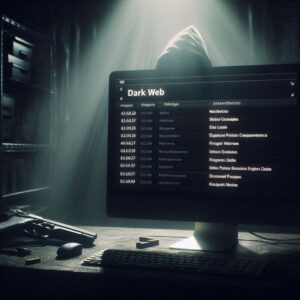Your cart is currently empty!
Dark Web Secrets: Exploring the Hidden Internet Realm

Diving Deep into Dark Web Investigations: Unraveling Its Complexities
The Dark Web represents a mysterious and often misunderstood dimension of the internet, accessible only through specific software and configurations that protect user identities. Unlike the open web, this hidden area requires tools like Tor to navigate, adding layers of intrigue and secrecy. Characterized by a strong emphasis on anonymity, the Dark Web has become synonymous with various illegal activities, including drug trafficking, arms dealing, and human trafficking. Additionally, it facilitates a marketplace for cybercriminals where stolen data, credit card information, and sensitive materials are traded. Within this shadowy framework, users can engage in illicit exchanges, participate in forbidden discussions, and connect with communities that operate beyond the reach of law enforcement, all while cloaked in anonymity.
In stark contrast to the easily navigable surface web, the Dark Web is constructed upon a sophisticated architecture that expertly conceals user identities through advanced encryption methods and multiple layers of protection. Most individuals access this hidden realm using specialized software, primarily Tor (The Onion Router), which anonymizes their online activities by routing traffic through a network of volunteer-operated servers. This intricate system complicates the efforts of anyone attempting to conduct network surveillance or traffic analysis, making it exceedingly difficult to track a user’s location or actions. While the Dark Web can indeed serve as a secure communication platform for whistleblowers and political dissidents, its notorious reputation is primarily due to its connections with criminal enterprises and illegal undertakings, creating substantial challenges for law enforcement agencies striving to maintain order.
Strategic Approaches for Safely Navigating the Dark Web
- Recognize that the Dark Web is a hidden segment of the internet requiring specific software for access, often associated with a variety of illicit activities that can pose serious risks.
- Acknowledge that exploring the Dark Web carries significant dangers, including identity theft, financial fraud, and exposure to explicit or harmful content that can have lasting repercussions.
- DarkSearch stands out as a powerful tool, enabling users to safely explore the Dark Web through its capabilities as an anonymous search engine.
- Users may come across a variety of content, including illegal products and services, stolen data, black market transactions, and even legitimate resources on the Dark Web.
- To ensure safety while delving into the Dark Web, it is vital to use a secure VPN, approach links with caution, and manage personal data sharing meticulously.
Recognizing and Mitigating Risks Associated with Dark Web Activities
The Dark Web presents significant threats not only to individuals but also to the broader society. It has emerged as a central hub for a plethora of criminal activities, including the rampant trade of narcotics, firearms, and stolen data, which fuels the operations of various criminal organizations. The perilous nature of this environment heightens the risk of identity theft, financial fraud, and other cybercrimes that can have devastating effects on unsuspecting victims. The anonymity the Dark Web offers complicates law enforcement’s ability to track and apprehend offenders, granting cybercriminals a misleading sense of security.
Furthermore, the Dark Web is alarmingly involved in facilitating human trafficking and exploitation. Its unregulated and anonymous characteristics create a haven for traffickers, leading to a disturbing increase in the online exploitation of vulnerable individuals, especially minors who may be coerced into sex work or other forms of modern slavery. The Dark Web also serves as a breeding ground for extremist ideologies and terrorist propaganda, presenting serious threats to national security and public safety. This reality highlights the urgent need for continuous vigilance and proactive measures from society to counteract these dangers.
The prevalence of illegal content and activities on the Dark Web has far-reaching societal consequences. It fosters a culture of lawlessness that undermines efforts to create a safer online environment. Consequently, it is crucial for users to remain aware of the inherent risks associated with the Dark Web and take proactive measures to shield themselves from its potentially harmful effects.

Expert Insights for Securely Navigating the Dark Web with DarkSearch
DarkSearch is a cutting-edge search engine meticulously crafted to empower users in safely exploring the Dark Web. This innovative tool allows individuals to search for specific content without compromising their anonymity or personal privacy. Equipped with robust encryption and privacy protections, DarkSearch ensures that users can traverse the Dark Web without the persistent threat of being tracked or surveilled by malicious actors.
A standout feature of DarkSearch is its ability to offer users a well-curated selection of verified and reputable Dark Web websites. This functionality is crucial in helping users steer clear of illegal or harmful content, instead guiding them toward trustworthy resources and valuable information. Furthermore, DarkSearch integrates essential security measures to shield users from fraudulent sites and phishing scams, significantly reducing the risk of falling victim to cybercrime during their browsing experiences.
Additionally, DarkSearch opens the door to a wealth of information and resources typically inaccessible on the surface web. This includes niche forums, marketplaces, and communities dedicated to diverse interests, enabling users to connect with like-minded individuals in a secure and private setting. By utilizing the capabilities of DarkSearch, individuals can responsibly navigate the Dark Web, avoiding the pitfalls of illegal activities while still accessing valuable insights and information.

Uncovering the Varied Spectrum of Content Available on the Dark Web
The Dark Web contains a broad array of content, ranging from legitimate to illegal activities. Its infamous reputation primarily stems from its role as a marketplace for illicit goods and services, including the sale of drugs, firearms, counterfeit currencies, and stolen personal data. This hidden environment is particularly alluring to criminals seeking to conduct transactions with minimal risk of detection by law enforcement.
Beyond these illegal marketplaces, the Dark Web also hosts forums and groups that cover an extensive range of topics, including hacking, cybercrime, political activism, and whistleblowing. These platforms offer individuals a secure space to engage in controversial discussions and share information without the fear of censorship or surveillance. However, they can also become breeding grounds for criminal behavior and extremist ideologies, posing significant threats to public safety and national security.
Despite its connections to illegal activities, the Dark Web serves several essential functions. It provides a secure platform for whistleblowers and activists to disseminate critical information and highlight issues of corruption and human rights abuses without fear of retribution. Additionally, the Dark Web is home to a wealth of resources that may be censored or unavailable on the surface web, making it an invaluable tool for those seeking uncensored knowledge and alternative perspectives.
Vital Safety Strategies for Exploring the Dark Web
While navigating the Dark Web exposes users to various risks, several strategies can be employed to protect against potential threats. Utilizing specialized software such as Tor is crucial for secure browsing on the Dark Web. Tor encrypts internet traffic, effectively concealing users’ locations and online activities from any potential surveillance or traffic analysis, thus empowering users with a greater sense of privacy.
Exercising caution is paramount during Dark Web exploration. It is essential to avoid clicking on unknown links or downloading unexpected files, as the Dark Web is rife with malicious sites specifically designed to steal sensitive information or infect users’ devices with harmful software. Users can enhance their security by limiting visits to trusted and verified websites while navigating this concealed digital landscape.
Moreover, individuals should refrain from sharing personal information or engaging in transactions on the Dark Web. The inherent anonymity of this environment complicates the verification of merchants or buyers, significantly increasing the risk of scams and fraud.
Utilizing a virtual private network (VPN) can substantially enhance security while exploring the Dark Web. A VPN encrypts internet traffic and masks the user’s IP address, making it more difficult for malicious entities to trace or monitor online activities.
By adhering to these safety guidelines and maintaining vigilance during Dark Web explorations, users can significantly minimize their exposure to potential threats and safeguard themselves against the dangers linked to cybercrime.
Legal and Ethical Considerations When Utilizing DarkSearch
When using DarkSearch or engaging with the Dark Web, individuals must be acutely aware of the legal and ethical implications involved. Accessing certain types of content or participating in specific activities on the Dark Web may infringe upon local laws or ethical standards, potentially leading to serious legal ramifications or moral dilemmas.
A key legal consideration while using DarkSearch is the risk of encountering unlawful content or activities. Users must understand that accessing illegal marketplaces or engaging in criminal behaviors on the Dark Web can result in severe legal consequences, including prosecution and imprisonment. Therefore, exercising caution and adhering to local laws while exploring the Dark Web is essential to avoid unintended violations.
Equally important is recognizing the ethical ramifications of using DarkSearch. Users should be mindful of the dangers associated with engaging with harmful content or facilitating illegal actions on the Dark Web. This includes avoiding transactions involving illicit goods or services, steering clear of participating in criminal enterprises, and promptly reporting any illegal activities encountered during their exploration.
When accessing sensitive information or discussing contentious topics on the Dark Web, it is crucial to consider the moral implications. Approaching such subjects with care and empathy is essential, as it acknowledges the potential impact on individuals or communities affected by these issues.
By staying vigilant and considering the legal and ethical factors while utilizing DarkSearch, individuals can navigate the Dark Web responsibly and safely.

Forecasting Future Developments in the Dark Web: Innovations and Their Consequences
The future landscape of the Dark Web is on the brink of significant transformations and implications that could drastically shape its trajectory. As technology advances, concerns about the potential for increasingly sophisticated cybercriminal activities flourishing within the Dark Web are intensifying. Innovations in encryption methods, anonymization technologies, and decentralized networks may further complicate law enforcement’s ability to monitor and contain illegal activities within this concealed domain.
Moreover, the importance of international cooperation in addressing the challenges posed by the Dark Web cannot be overstated. Given that illicit operations on the Dark Web frequently transcend national borders, the necessity for collaborative efforts among governments, law enforcement agencies, and technology companies is critically important. This includes intelligence sharing, coordinating efforts, and establishing regulatory frameworks to mitigate the risks associated with the Dark Web, underscoring the essential roles played by each entity in tackling this global issue.
Additionally, ongoing discussions regarding potential government interventions aimed at combatting unlawful activities on the Dark Web while protecting individual privacy rights are gaining traction. Striking a balance between addressing cybercrime and safeguarding freedom of expression and internet privacy presents a complex challenge. As policymakers navigate these intricate considerations, they must prioritize informed decision-making to ensure that legislative measures effectively combat illegal activities on the Dark Web without infringing upon individual rights.
Future developments in the Dark Web will have profound implications for cybersecurity, law enforcement, personal privacy rights, and global security. By staying informed about emerging trends and changes, individuals can better understand the evolving landscape of the Dark Web and take proactive measures to protect themselves from its associated threats.
Comprehensive Responses to Frequently Asked Questions About the Dark Web
What defines a Dark Web search engine, and how does it operate?
A Dark Web search engine is specifically engineered to assist users in navigating the Dark Web, a concealed segment of the internet that is not indexed by traditional search engines. This tool empowers individuals to discover and access hidden websites and exclusive content that are typically unreachable through conventional web browsers, enriching their exploration experience.
What mechanisms do dark web search engines employ to function?
Dark web search engines utilize specialized algorithms that crawl and index content located within the hidden realms of the Dark Web. These engines access concealed websites and extract information, making it searchable for users who wish to explore this hidden digital landscape more effectively and efficiently.
Is it legal to use a dark web search engine?
Utilizing a dark web search engine is not inherently illegal, as it serves merely as a tool for accessing content on the Dark Web. However, users must recognize that the Dark Web is often linked with illegal activities, and engaging with certain content or participating in unlawful actions may contravene local laws.
What risks are associated with utilizing a dark web search engine?
Several risks accompany the use of dark web search engines, including exposure to illegal and harmful content, potential malware infections, and the risk of being targeted by cybercriminals. Exercising caution and implementing appropriate security measures is essential when accessing the Dark Web to mitigate these risks.
Is it possible to access the Dark Web without utilizing a dark web search engine?
Technically, it is feasible to access the Dark Web without a search engine by using specialized software like Tor, which allows users to browse anonymously and reach hidden websites. However, employing a dark web search engine can simplify the process of finding specific content and enhance navigation through the Dark Web.
References:
Pros and Cons of Internet Usage – Good and Bad Effects. https://thetechprint.com/pros-and-cons-of-internet-usage
Is it Illegal to Access the Dark Web? – Exploring the Dark Corners of the Digital World: A Tale of Mexican Hackers. https://www.hackersmexicanos.com/is-it-illegal-to-access-the-dark-web/
The post Deep Search: Unveiling the Invisible Dark Web appeared first on Ezi Gold.
The Article: Dark Web Exploration: Discovering the Hidden Internet Depths Was Found On https://ai.ezi.gold
The Article Dark Web Exploration: Unveiling the Hidden Internet Secrets Was Found On https://limitsofstrategy.com
Comments
4 responses to “Dark Web Secrets: Exploring the Hidden Internet Realm”
Your exploration of the Dark Web brings to light the striking dichotomy between its potential uses for anonymity and the darker activities that flourish within its depths. It’s fascinating to consider how this anonymity can be a double-edged sword; while it protects whistleblowers or journalists in oppressive regimes, it also fosters a breeding ground for crime and exploitation.
This is such an intriguing exploration of the Dark Web and the complexities that underlie it. Your breakdown of how it operates and its notorious reputation for facilitating illicit activities really highlights the duality of this hidden corner of the internet. It’s fascinating—and somewhat unsettling—to think about how anonymity can foster both community and criminality.
You raise some really interesting points about the duality of the Dark Web. It’s true that the anonymity it offers can create such a complex landscape. On one hand, it allows for the safe exchange of information and even community-building among marginalized groups. There are forums and spaces where individuals can discuss issues that are difficult to talk about in the open, whether it’s mental health, social justice, or even political dissent.
Your exploration of the Dark Web really highlights its multifaceted nature. It’s fascinating how, while it’s often associated exclusively with illicit activities, there are also voices and communities who use this space for legitimate purposes—like sharing information under oppressive regimes or protecting privacy in a surveillance-heavy world.